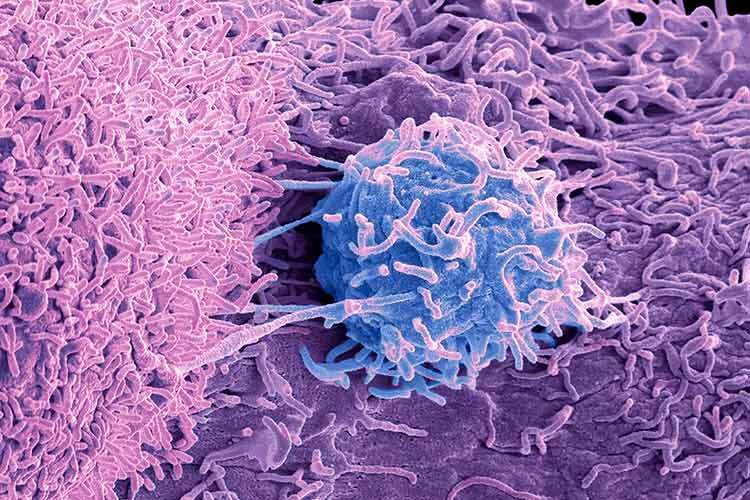Prostate cancer is the most common type of cancer in men, with an estimated 1.5 million new cases per year. By 2040 they are projected to increase to 2.9 million, according to a statement from The Lancet Commission on prostate cancer. Given this scenario, fostering timely detection is essential.
“Unfortunately, although it is very common, not all patients have access to early detection or adequate treatment,” says Carlos Delgado, an urologist at the National Institute of Cancer (INCan), in an interview with TecScience.
According to the expert, compared to breast cancer, prostate cancer is less diagnosed and, when it is, it is usually in advanced stages.
This is due, in part, to the fact that initially there are practically no symptoms, but notions associated with gender roles also come into play. In addition, there is the idea that the prostate examination will be invasive and painful.
“Whether due to machismo or lack of education, many men postpone or avoid seeing a urologist,” says Delgado.
Although in recent decades there has been great progress in early detection methods and treatments for each stage, ideas associated with masculinity can lead men to neglect their health.
This is worrying, because although this type of cancer could be prevented with a healthy diet, frequent exercise and not smoking, detecting it early is one of the most efficient ways to attack the problem.
How to Achieve Timely Detection of Prostate Cancer?
To date, the causes of prostate cancer are not entirely clear, but it has been found that there is an important genetic factor. “If they have a father or brother with this type of cancer, they are much more likely to suffer from it as well,” explains Delgado.
The good news is that the risk of suffering from it due to genetic causes can be detected with a test to find mutations in the BRCA2 gene.
Also, a prostate-specific antigen (PSA) test can be performed, this is a protein produced by prostate cells that is usually elevated in people with this condition: “In many cases, a prostate examination is not even necessary,” says the urologist.
If the BRCA2 test is positive, what is recommended is to have a PSA test at age 40 with a follow-up every two or five years, depending on the levels the test shows.
For men without a hereditary risk factor, it is recommended that they take the PSA test when they turn 50, since it is estimated that six out of ten cases are detected in men over 65 years of age.
Depending on PSA levels at the time of testing, they may be followed up every two to five years.
“Women know that from a certain age they have to go to the gynecologist for their annual Pap smear or mammogram,” says Delgado. “It is important for all men to know that from the age of 50 [getting tested] is something they have to do.”
Prostate Cancer in Latin America
According to Delgado, attending a consultation with a urologist, andrologist -a urologist specialized in reproductive aspects of men- or a general physician to undergo the PSA test is essential.
“If the probability of cancer is detected, we can do a biopsy or an MRI to confirm the diagnoses and find out how advanced it is,” says the expert.
With these tools, if cancer is found, doctors can determine the best treatment for each case. When it is found during the early stages of the disease, it is much more likely that it will be located only in the prostate and not spread to the bones or other organs.
“Currently, in Latin America, 50% of patients continue to be diagnosed at a stage in which it is no longer curable,” urges Delgado.
With the importance of timely detection in mind, Miguel Ángel Jiménez, director of Urology at INCan, launched the Opus Program for the comprehensive treatment of this condition.
In 2019, when it started, only 32% of cases were detected when they were located only in the prostate. By 2023, this figure rose to 81%.
This speaks to the importance of timely detection and the need to establish programs of this type throughout the country. “Although the program has been successful, the outlook in the rest of the country and Latin America in general is not good,” says the expert.
The infrastructure necessary to detect and treat prostate cancer in time is still lacking in the region.
More Awareness Campaigns are Needed
In Mexico, a greater awareness about the risks of suffering from prostate cancer and the need to have a PSA test starting at age 40 or 50 -depending on their genetic risk- is also needed among the population.
“Every October we put the focus on breast cancer, but campaigns aginst prostate cancer aren’t so strong or numerous,” says Delgado.
This does not mean that efforts to prevent breast cancer should be stopped, but that we need equally good campaigns to prevent prostate cancer.
Studies around the world have shown that, in general, public health campaigns are effective in informing the population about conditions and have increased the number of women who go get a mammogram.
Also, it has been found that social networks could help spread this information, when done hand in hand with experts.
What Treatments are Available for Prostate Cancer?
When it is detected in time, depending on the stage at which prostate cancer is found, there are different treatments, such as surgery, radiotherapy, chemotherapy or hormonal therapies.
“Right now there is a revolution in terms of treatments, whether it is localized or if it has already metastasized,” says the expert. “There are very good options that can lead to it becoming a chronic, non-lethal disease, even in advanced stages.”
In the future, it is essential that Latin American countries invest more in the prevention, detection and treatment of prostate cancer, as it is a complex problem that requires the coordinated effort of the state, experts and society.
“It is important for men to lose their fear of going to a urologist or get tested; taking the antigen test can save their life,” invites Delgado.
Were you interested in this story? Do you want to publish it? Contact our content editor to learn more marianaleonm@tec.mx
















